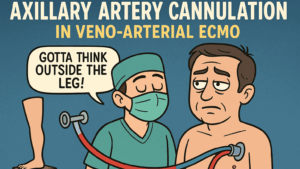
Alternative Arterial Access in Veno-Arterial ECMO: The Role of the Axillary Artery
This review explores axillary artery cannulation as an alternative arterial access in veno-arterial ECMO. While femoral access is most common, it carries risks of limb ischemia and differential hypoxia. Axillary access provides antegrade flow, enhancing cerebral and coronary perfusion, reducing North–South syndrome, and enabling mobilization. However, it is technically demanding, with risks such as hyperperfusion and nerve injury. More prospective studies are needed for patient selection and outcomes.










